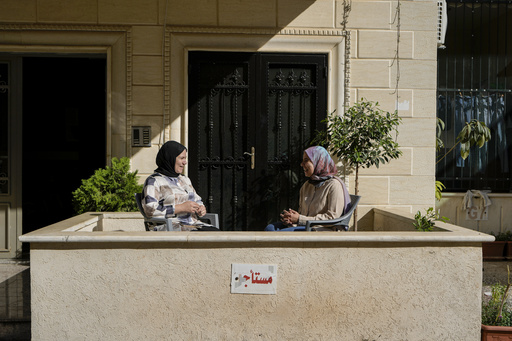
“`html
In the small village of Mhaibib, southern Lebanon, memories intertwine with devastation for Ayman Jaber, who lovingly refers to Mhaibib as his “habibti,” the Arabic term for “beloved.” This village, which translates to “the lover” or “the beloved,” holds a treasured place in Jaber’s heart, reminiscent of youthful encounters with his childhood sweetheart in a courtyard behind his uncle’s house. “I eagerly awaited her arrival,” Jaber reminisced with a warm smile. “Half of the village knew about our special bond.”
The stark contrast between those joyful childhood memories and the current state of destruction is profound. Mhaibib, situated on a hillside near the Israeli border, suffered significant damage during a series of explosions on October 16. Videos released by the Israeli army depicted blasts devastating the village in Marjayoun province, turning numerous homes to rubble.
This scene of devastation has also echoed across other villages in southern Lebanon since Israel commenced its military operation a month ago, which it claims aims to push Hezbollah militants away from the border. On October 26, powerful explosions in and around the village of Odaisseh triggered earthquake alerts in northern Israel.
Israel emphasizes the importance of dismantling a vast network of Hezbollah tunnels in the region. However, for displaced residents, the relentless bombings are not merely military actions but rather obliterations of their lifetimes of cherished memories.
Mhaibib had already faced sporadic military targeting since the exchange of fire between Hezbollah and Israeli forces began on October 8 last year. Before the escalation of conflict, Jaber resided in Aramoun, just south of Beirut, whilst his family remained in Mhaibib until the violence intensified, prompting many to flee, leaving their belongings behind. In the aftermath, Jaber’s father and two sisters sought refuge with him, having evacuated from Mhaibib.
In the modest living room of their temporary residence, the family shares Arabic coffee as their father sits nearby puffing on cigarettes. “Watching my father suffer breaks my heart. He is 70 and frail, longing to return to Mhaibib after a journey of over a year,” shared Zeinab, one of his sisters. “He left behind five cows and continually asks, ‘Do you think they’re still alive?’”
Mhaibib was once a tightly-knit community, featuring around 70 historic stone houses lining its narrow streets. Farming activities flourished, with families cultivating tobacco, wheat, mulukhiyah, and olives, tending to their fields each spring and rising before dawn throughout the summer to harvest their crops.
The village was also home to an ancient shrine honoring Benjamin, son of Jacob. In Judaism, he is a significant figure, while in Islam, he is recognized as prophet Benjamin Bin Yaacoub, the 12th son of Yaacoub and brother to prophet Yousef. The shrine, damaged during the 2006 war between Israel and Hezbollah, was later restored. Images show it initially enclosed in a golden cage, graced with intricate Arabic inscriptions beside an old stone mosque crowned with a minaret. Sadly, both the mosque and shrine have been demolished.
Hisham Younes, director of the environmental group Green Southerners, expressed his anguish, stating that generations had held Mhaibib in high regard for its charming one- and two-story stone homes, some created by Jaber’s grandfather and their contemporaries. “Detonating an entire village constitutes collective punishment and may be classified as a war crime,” Younes stated. “What is gained from the destruction of shrines, churches, and historical residences?”
Abdelmoe’m Shucair, mayor of nearby Mays el Jabal, confirmed that most residents in Mhaibib fled before the Israeli attacks began, joined by people from adjacent villages. Jaber’s sisters used to attend school in Mays al-Jabal, which has also been obliterated in the ongoing bombings. After completing her education in Beirut, Zeinab worked in a pharmacy located in the neighboring village of Blida, which has similarly vanished due to military actions. In addition, even their family cemetery has been bulldozed, erasing generations of their ancestry.
“I have no political affiliations,” Zeinab emphasized. “Why did I have to lose my home and my life?” The devastation has been too painful, and she cannot face the videos showcasing her village’s ruin. “The moment my brother played it, I fled the room.”
To cope with her anguish, Fatima envisions Mhaibib whenever she closes her eyes. She recalls breathtaking sunsets, as family gatherings unfolded on their terrace, surrounded by her mother’s treasured blooms. Over a decade, their family painstakingly transformed their home. “It took us ten years to add just one room,” she recounted. “My father laid down the flooring, constructed the walls and roof, and installed the windows. My mother sold a year’s worth of homemade preserves just to furnish it.” The pain in her voice deepened. “And it was all taken away in an instant.”
Amidst the turmoil, Zeinab quietly wed and is now six months pregnant, hoping to return to Mhaibib in time to welcome her baby. Her brother Ayman was born when Mhaibib was under Israeli occupation, and he recalls the long and arduous journey from Beirut to Mhaibib, where they endured multiple security checks before finally reaching their village. “Those checks and interrogations used to consume an entire day,” he remembered. Inside Mhaibib, it always felt like they were being watched.
During the war in 2006, the family had previously evacuated the village, and upon their return, they discovered their homes vandalized but still intact. Tragically, uncles and their grandmother lost their lives in the conflict, yet a loquat tree planted by their matriarch survived. Now, however, there is no home left to return to, and even the loquat tree has disappeared.
Jaber reflects on the possibility of Israel establishing a long-term presence in southern Lebanon, filled with dread at the thought of not being able to rebuild the home he had worked hard to create for himself, his wife, and their two sons. “When this war concludes, we will return,” a quiet determination underscored Ayman’s words. “We will set up tents if necessary and remain until we reconstruct our homes.”
“`
